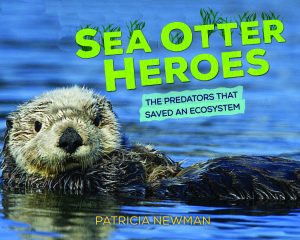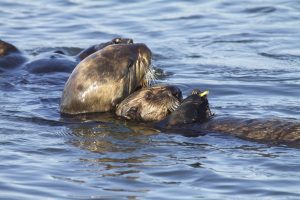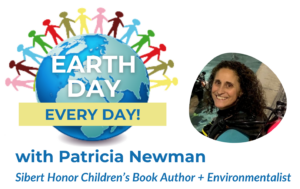Do you love sea otters? You already know these marine mammal predators are cute, but did you know they’re heroes as well? Truly! To celebrate their heroics, I plan to extend Sea Otter Awareness Week (Sept. 24-30) over the entire month of September with some fascinating info that will make you appreciate them all over again.

I found out about Brent’s fascinating discovery at a retreat for conservation scientists. I wrote this book with their help. Click HERE to watch the trailer created by 5th and 6th graders at Foulks Ranch Elementary School in Elk Grove, CA.
The Plan
For the next four weeks, expect interviews with two marine experts–and stars of Sea Otter Heroes–whose work helps us appreciate why sea otters are an important endangered species worth saving.
- Dr. Brent Hughes, a marine biologist with the University of California at Santa Cruz-Long Marine Lab who discovered a new trophic cascade involving sea otters, an apex predator in Elkhorn Slough (just off Monterey Bay in Northern California)
- Lilian Carswell, the Southern Sea Otter Recovery and Marine Conservation Coordinator for the US Fish and Wildlife Service.
Post One: Want a job saving sea otters? Find out how Lilian found hers.
Patricia Newman: Saving sea otters must be the coolest job in the world. Tell us how you got your job, where it has taken you, and what you love about it.
Lilian Carswell: I was working at a Florida wildlife refuge monitoring red wolves and sea turtles in the early 2000s. I was planning my next move after the season (and my temporary job) ended, and I decided I wanted to focus on marine mammals. I happened to see a job opening with the US Fish and Wildlife Service in Ventura working on sea otter issues, which I was lucky enough to get, partly because of my background in writing.
Although they warned me that it was mostly a desk job, not a field job, I’ve had some great field adventures while working my way up to the position of Southern Sea Otter Recovery & Marine Conservation Coordinator. I’ve worked on sea otter research projects in Russia (Bering Island and the Kuril Islands), Canada (Vancouver Island), and California (mainland and San Nicolas Island). I’ve also had the opportunity to participate for 3-4 weeks at a time in a number of cetacean research cruises organized by our sister agency, the National Marine Fisheries Service, in the waters off Hawaii, Washington, Oregon, and California. I was invited to Alaska for community workshops on sea otters with fishermen and Native communities, and I have done a couple of month-long details at our headquarters office in Virginia.
Although my job is not always as exciting as that, nearly everything I do is directed in some way toward furthering the conservation of sea otters and other marine organisms, and I value that above all. How many of us get to do work we truly believe in?
Next Monday: Brent’s Science Tips
Brent Hughes, the marine biologist who solved an ecological mystery and discovered an amazing new trophic cascade, gives kids tips on studying science in school.
Can’t Wait?
If you want more before the next post, visit my Sea Otter Heroes webpage to download an adorable sea otter book mark.
[Featured photo credit: Lilian Carswell/USFWS]






Leave a Reply
Your email is safe with me.